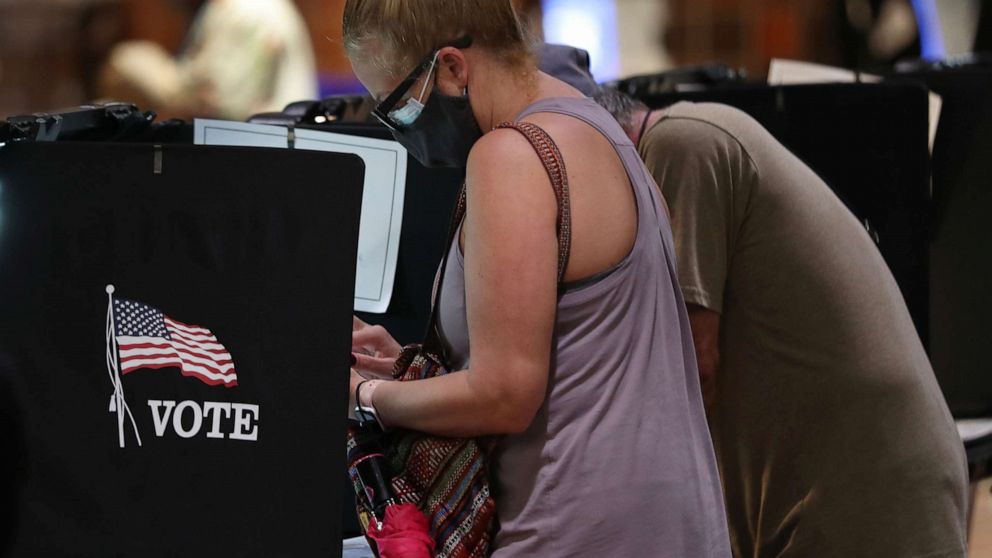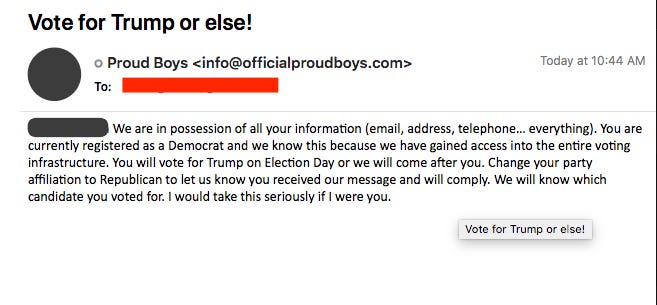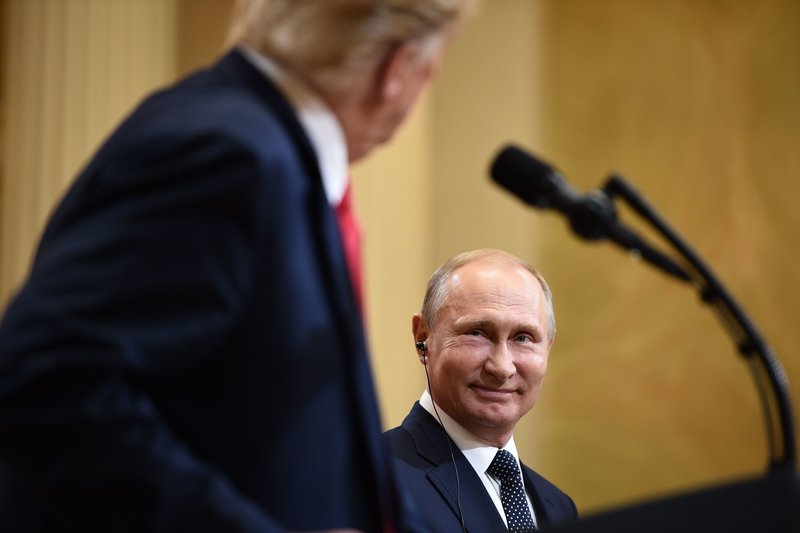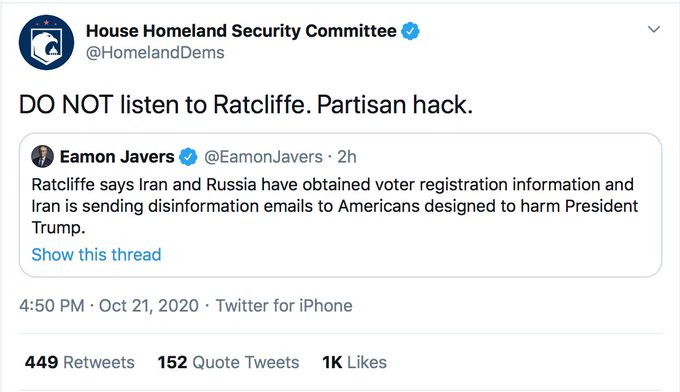
Photographer: Joe Raedle/Getty Images
On Oct. 20, Director of National Intelligence John Ratcliffe said that both Iran and Russia have obtained U.S. voter registration information in an effort to interfere in the election. So far, these efforts have included Iranian attempts to pose as the far-right group Proud Boys to send intimidating emails to voters, according to CNN.
Ratcliffe appeared alongside FBI Director Chris Wray during a news conference covered by CNBC on Wednesday, Oct. 21, with details about Iran’s network intrusion interference. Official reports show that Iran was responsible for an email campaign made to look as if it came from the Proud Boys, a far-right group that USA Today reports
“This data can be used by foreign actors to attempt to communicate false information to registered voters that they hope will cause confusion, sow chaos and undermine your confidence in American democracy, we have already seen Iran sending spoof emails designed to intimidate voters, incite social unrest and damage President Trump. You may have seen some reporting on this in the last 24 hours, or you may have even been one of the recipients of those emails,” Ratcliffe said.
According to CNN, the suspicious emails were sent to registered voters from “info@officialproudboys.com” and warned recipients to “vote for Trump or else!”
VICE reports that the link takes the user to a
FWAB ballots are described by the government as “emergency backup ballots” for military members and citizens who live overseas and did not receive mail-in or absentee ballots from their states. Election experts say this is designed to make voting easy because FWAB ballots are only used as a matter of last resort and that other types of ballots supersede FWAB. Only certain people qualify for FWAB ballots; for example, military members and citizens working abroad.
“FWABs are typically ballots of last resort, and if any other ballot has been submitted by the voter, they trump the FWAB,” Matt Bernhard, a cybersecurity researcher who works for the election security non-profit VotingWorks, said
In regards to the video hosted on Orangedox sent via email to intimidate voters, Brown told CNN in a statement, “Orangedox does not condone the use of our services that might ‘violate the law in any way including publishing or sharing material that’s fraudulent, defamatory, misleading, or that violates the privacy or infringes the rights of others.”
“Orangedox does not condone the use of our services that might ‘violate the law in any way including publishing or sharing material that’s fraudulent, defamatory, misleading, or that violates the privacy or infringes the rights of others,” Brown told CNN in a statement.
Enrique Tarrio, the chairman of the Proud Boys, denied that the group sent the emails. The Washington Post reports that the emails were engineered by someone working at the behest of the Iranian government, according to a U.S. official who spoke anonymously because of the matter’s sensitivity. The operation appeared to exploit the vulnerability in the Proud Boys’ online network.

A redacted email sent to an Alachua County voter on Tuesday morning, sent to The Sun. Law enforcement is investigating several emails being sent to voters purporting to be written by the extremist group, The Proud Boys, pressuring residents to vote for President Trump. Email courtesy of reader whose name is redacted
Pensacola News Journal in Florida reports that at least 15 Escambia County voters notified officials that they received threatening emails ordering them to vote for President Trump. Escambia County Supervisor of Elections David Stafford cautioned the number might have grown since he was last updated on the situation.
“What we know at this point is we’ve turned it over to the authorities and presumably they’ll take it from there,” Stafford said.
Stafford said his office was contacted Wednesday morning by Pensacola police about a report of a threatening email sent to a voter, and his office has received more calls directly from voters throughout the day, Pensacola News Journal reports.
Back in August of this year, The Washington Post reported that William Evanina, the intelligence community’s top election security official, claimed that Russia, Iran and China were all aiming to interfere in the 2020 election.
“Russia is using a range of measures to interfere in the 2020 election and has enlisted a pro-Russian lawmaker from Ukraine — who has met with President Trump’s personal lawyer — to undermine former Vice President [Joe] Biden’s candidacy and the Democratic Party,” said Evanina in a statement on Aug. 7.
Evanina also said that the government of China does not want Trump to win re-election in November, as they view the incumbent as “unpredictable.” He described China’s efforts to date as largely rhetorical, aimed at shaping policy and criticizing the Trump administration for actions Beijing sees as harmful to its long-term strategic interests.
According to the official statement from the Office of the Director of National Intelligence (ODNI) News Release No. 29-20, Director William Evanina states:
“Many foreign actors have a preference for who wins the election, which they express through a range of overt and private statements; covert influence efforts are rarer. We are primarily concerned about the ongoing and potential activity by China, Russia, and Iran.”
Evanina elaborates that China has been expanding its influence efforts by pressuring political figures in opposition to China’s interests and deflecting counter criticism of China with the purpose of making sure Trump does not win re-election. He continues to state that Russia is using a range of measures to denigrate former Vice President Biden and what it sees as an anti-Russia establishment. Evanina also describes Iran’s efforts as focused on online influence, such as spreading disinformation on social media and recirculating anti-U.S. content while dividing the country in advance of the 2020 elections.
The press release explained that the IC recognizes there will be a continued demand for more information as the election approaches. Furthermore, the IC will continue to provide classified election threat briefings to the presidential campaigns, political committees and all Members of Congress. Evanina states that the IC has provided nearly 20 classified election threat briefings to these stakeholders since mid-May 2020 and that they would keep providing updates to the American public, staying consistent with national security obligations.

President Trump and Russian President Vladimir Putin attend a joint press conference after a July 2018 meeting in Helsinki.
Photographer: Brendan Smialowski/AFP via Getty Images
The statement released by Evanina echoes a similar warning from other top officials in the intelligence community. In January, Shelby Pierson, the Intelligence Community’s Election Threats Executive, told NPR that more countries may attempt to interfere in U.S. politics given the success of Russian efforts during the 2016 presidential election.
“This isn’t a Russia-only problem,” Pierson said. “We’re still also concerned about China, Iran, nonstate actors, ‘hacktivists.’ And frankly […] even Americans might be looking to undermine confidence in the elections.”
Former Trump campaign chairman Paul Manafort, who was later convicted for financial fraud crimes, briefed Russian intelligence officer Konstantin Kilimnik on the campaign’s polling data and how the Trump campaign sought to beat Hillary Clinton in the 2016 presidential election, according to NPR. The findings draw a direct line between the president’s former campaign chairman and Russian intelligence during the 2016 campaign. The findings were a part of the Senate Intelligence Committee’s fifth and final bipartisan report that investigated Manafort’s connection with Russian intelligence officer Kilimnik. The report labeled this “grave counterintelligence threat,” adding that it found evidence the Russian intelligence officer may have been linked to the Russian government’s efforts to hack and leak Democratic Party emails.
The report was primarily focused on counterintelligence threats and the wide range of Russian attempts to influence both the Trump campaign and the election, building upon the special counsel Robert Mueller’s investigation.
Democrats and a group of former intelligence officials have accused Ratcliffe, a former Republican congressman tapped to lead the intelligence community this year, of selectively declassifying intelligence in the run-up to the election to help Trump’s campaign. Democrats on the Homeland Security Committee also criticized him after the news conference.

Courtesy of Twitter
“DO NOT listen to Ratcliffe. Partisan hack,” the committee’s Twitter account said Wednesday evening in a tweet that was later deleted. The committee followed that statement by saying, “TO CLARIFY: These election interference operations are clearly not meant to harm President Trump.”
Senate Minority Leader Chuck Schumer, a New York Democrat, told MSNBC’s Rachel Maddow, “I had the strong impression it was much rather to undermine confidence in elections and not aimed at any particular figure. And I’m surprised that DNI Ratcliffe said that at his press conference if he did.”
Andrew McCabe, a former deputy FBI director and CNN analyst, said the news conference shows how far the U.S. government has come from the 2016 election when it failed to react strongly to Russia’s foreign interference in the run-up to the election. He added that he wanted to learn more about the intelligence that Iran intended to hurt Trump.
“There should be really solid analysis underpinning that judgment and I just don’t think we’ve gotten enough of that detail from the information that was shared with the press this evening,” McCabe said.
Just before the news conference began, the top two members of the Senate Select Committee on Intelligence — Sens. Marco Rubio, a Florida Republican, and Mark Warner, a Virginia Democrat — released a joint statement warning about foreign interference in the election.
“As we enter the last weeks before the election, we urge every American — including members of the media — to be cautious about believing or spreading unverified, sensational claims related to votes and voting,” the statement read. “State and local election officials are in regular contact with federal law enforcement and cybersecurity professionals, and they are all working around the clock to ensure that Election 2020 is safe, secure, and free from outside interference.”
Sen. Angus King of Maine, an Independent who caucuses with the Democrats, said in a statement that the developments showed that American voters are under attack.
“We likely will be facing this challenge through November 3 and beyond — so updates like these will be necessary as developments warrant,” King said. “The American people need to be skeptical and thoughtful about information they receive, and election officials need to be doubly cautious because they are being targeted.”
